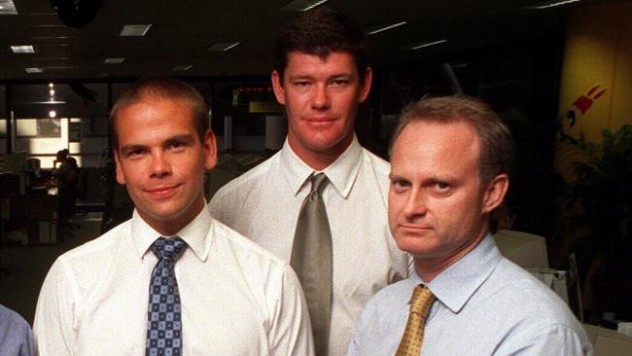 Weird Stuff
Weird Stuff  Weird Stuff
Weird Stuff  History
History 10 Times Trickery Won Battles
 Technology
Technology 10 Awesome Upgrades to Common Household Items
 Misconceptions
Misconceptions 10 Hilarious (and Totally Wrong) Misconceptions About Childbirth
 Weird Stuff
Weird Stuff 10 Warning Labels That Exist Because Someone Actually Tried It
 Health
Health Ten Confounding New Inventions from the World of Biomedicine
 Creepy
Creepy 10 Death Superstitions That Will Give You the Creeps
 Movies and TV
Movies and TV 10 Movies That Get Elite Jobs Right, According to Experts
 Weird Stuff
Weird Stuff 10 Times Real Laws Were Based on Bizarre Hypotheticals
 Animals
Animals 10 Inspiring Tales of Horses Being Human
 Weird Stuff
Weird Stuff 10 Typos That Accidentally Changed History
 History
History 10 Times Trickery Won Battles
 Technology
Technology 10 Awesome Upgrades to Common Household Items
Who's Behind Listverse?

Jamie Frater
Head Editor
Jamie founded Listverse due to an insatiable desire to share fascinating, obscure, and bizarre facts. He has been a guest speaker on numerous national radio and television stations and is a five time published author.
More About Us Misconceptions
Misconceptions 10 Hilarious (and Totally Wrong) Misconceptions About Childbirth
 Weird Stuff
Weird Stuff 10 Warning Labels That Exist Because Someone Actually Tried It
 Health
Health Ten Confounding New Inventions from the World of Biomedicine
 Creepy
Creepy 10 Death Superstitions That Will Give You the Creeps
 Movies and TV
Movies and TV 10 Movies That Get Elite Jobs Right, According to Experts
 Weird Stuff
Weird Stuff 10 Times Real Laws Were Based on Bizarre Hypotheticals
 Animals
Animals 10 Inspiring Tales of Horses Being Human
10 People Who Made Millions By Being Terrible At Their Job
Everyone’s had that moment where they look at some abstract piece of art by some famous painter and said to themselves “I could do that! I should be getting paid millions!” Turns out the same thought can also be triggered by looking at the way some bosses choose to run their companies. Thanks to the wonders of “golden parachutes” (massive severance packages) almost any idiot can take over a company, screw it up royally, and still walk away a millionaire.
10 Gary Forsee

Everyone who deals with customers on a daily basis dreams of being able to tell them to get lost, and it’s usually only a pressing need to eat that stops them from doing so. But Gary Forsee, CEO of the Sprint phone company, had no such pressing need on account of sitting on enough money to eat a different endangered species every day for the rest of his life.
Following his disastrous handling of the merger between Sprint and Nextel that ended up costing his company almost $30 billion, he began either cutting back on quality of service or ignoring it altogether. Many of his customers weren’t too thrilled with this, and when Sprint was fielding a large amount of complaints, Forsee responded by abruptly terminating the contracts of over 1,000 of these complaining, paying customers. Millions more decided that they didn’t really feel like paying to be treated like garbage, so they left for other companies. Fed up with his constant parade of dumbassery, the board decided to fire Forsee and give him a little going-away present of $13.5 million plus $85,000 per month for life, on top of the $40 million he made in salary and bonuses that year, all while thousands of Sprint employees were losing their jobs as a result of Forsee’s idiocy.
9 George Shaheen

In 1999, George Shaheen got a job as the top dog at Webvan, an Internet startup that was designed to deliver groceries right to people’s doors in half an hour or less. His yearly salary was $500,000, but with his stake in the company he could have made a whole lot more. That is, if he wasn’t terrible at his new job. In only 18 months, Webvan blew through over $1.2 billion of investor money and had nothing to show for it except late deliveries, missing items, and confused shrugs. Just over a year after Shaheen took the reins, Webvan was bankrupt. As Shaheen left the company, right after nosediving it straight into the ground, he was awarded a severance pay contract of $375,000 a year for the rest of his life.
That’s right. His reward for royally screwing up was to be given a small fortune every year, on top of the $1.5 million he made while he “worked” there. And we use the word “work” in the loosest sense, because by all accounts he really didn’t do much of anything. He had no experience whatsoever with an Internet company, and executives criticized him for being aloof and detached. As for Shaheen, he said “I’m proud of my contributions, and I came in and worked hard on a business model that was difficult to execute.” Well, good for you, buddy. Only in the land of CEOs does trying really, really hard make one worth millions when you mess up horribly.
8 Robert Nardelli

While Shaheen’s payout might seem like a lot, it’s nothing compared to what Robert Nardelli, former CEO of Home Depot, was paid when he quit the company. We’re just going to come right out and say it: $210 million. That’s how much he was paid for getting fired. In addition to that, his salary and bonuses over the five years he was in charge added up to well over $65 million, way more than anyone else who had anything to do with the company.
But the real question is, was he worth it? Of course not. He wouldn’t be on the list if he was. Nardelli was paid Scrooge McDuck quantities of money for getting thrashed by competitors on the home improvement battlefield. He seemed to get short-term results, but problems were always just below the surface: Net profits went up, but only as a result of him firing thousands of people and cutting way back on customer service—which is basically the one thing home improvement stores should never, ever, ever cut back on, because when the guy selling us a Phillips Head Screwdriver is just as clueless as we are, things aren’t going to go well. Nardelli’s main accomplishment was losing a lot of business to his competitors. It’s no coincidence that during his time as boss, Home Depot share price dropped by eight percent while the price of stocks in Lowe’s went up 180 percent.
7 Ron Johnson

Ron Johnson was the CEO of the floundering JC Penney chain of department stores for only 18 months before he was fired and given $53.3 million as a going-away present—ironically losing his position to the person he was originally hired to replace. All in all, his time there was one of the more expensive exercises in complete pointlessness. In this case, equal blame goes to both him and whoever had the bright idea of hiring him. The problem was that JC Penney was losing customers, largely because most people who shop there are old, and old people have the bad habit of dying. So they figured the best person to turn it around and make it cool again was Johnson, the brain behind the massively successful Apple stores. And everyone knows what a big, resounding hit Apple stores are with the elderly, right?
He immediately came up with a bunch of half-baked ideas that completely ignored what most customers wanted, like free haircuts for all the kids who never go there and the elimination of coupons (which, had he done his homework, he would have known were loved by everyone who shops there). The biggest warning sign came when Johnson decreed that these would all be nationwide changes, effective immediately. No testing them out in a select few stores, no waiting for shopper feedback—just everything, all at once. When politely asked whether he was out of his mind, he responded by saying that they didn’t do any such testing when he was at Apple, demonstrating that he was unable to tell the difference between an electronics store designed to cater to hip young people and a clothing store designed to serve old people, most of whom don’t even have their original hips. After he was fired, the first thing his replacement did was undo all his changes and run a series of ads apologizing for being so stupid. Not that Johnson cared either way: He was perfectly happy with the $50 million he made for only a few months of work.
6 Brian Driscoll

At least most of these guys actually tried to do their jobs—Hostess CEO Brian Driscoll just gave up and pocketed as much money as he could before the company tanked. When faced with a shrinking profit as people actually started trying not to be fat and stopped plowing through several bags of Hostess snacks a day, he knew it was time for drastic action. So he wracked his brain and plumbed the depths of his creativity and imagination, but all he could come up with was banana cream–flavored Twinkies. When that failure was followed by a worker’s strike, he reckoned it was time to bail.
By now, Hostess was preparing for bankruptcy. All over the company, people were losing their jobs and their pensions. So to congratulate himself on all the good work, Driscoll more than tripled his own salary to $2.5 million, and also gave a few other executives massive raises just because. Confident in a job well done, Driscoll took his millions of dollars and walked out the door, bidding a cruel farewell to all the suddenly unemployed, pensionless workers who made him rich.
5 Brian Dunn

One of the first rules in the management handbook is a stern warning not to sleep with an underling. Doubly so if that underling is about half your age. Evidently, this was too subtle for Best Buy CEO Brian Dunn.
To be fair, both he and his young partner said it was purely platonic, and there’s no evidence that they were actually having an affair. Only that he kept lavishing her with expensive gifts, that they went on big, long vacations together and that they phoned and texted back and forth hundreds of times a day. But yeah, that sounds totally platonic. It was this affair– er, “friendship” that eventually cost Dunn his job. Fortunately, he was given a $6.6 million payout with which to console himself. But odds are he wouldn’t have been around much longer anyway. Best Buy was, and still is, losing ground to its competitors, and Dunn never made any real attempt to lead the company out of its downward slide beyond getting the exclusive rights to a few underwhelming 3-D DVDs to go with an even more underwhelming 3-D TV. Possibly because he was too busy making friends.
4 Eddie Lampert

Imagine you’ve just been put in charge of a multi-billion dollar retail company with outlets all over the world. What’s the first thing you’d do? Some of us might take it slow and learn all we can. Some of us might pursue aggressive expansion. And some of us might fracture it into dozens of competing factions and cut their supply lines to make them fight to the death over a dwindling resources. Eddie Lampert, CEO of Sears/K-Mart, chose the last option—which has great entertainment value but isn’t the best way to run a business. He says he did it to reveal the weak points and ensure that the strongest would rise to the top. What actually happened was that each segment immediately started squabbling in hilariously petty ways, even going so far as to engage in turf wars over floor space, hoping to claim a few more precious inches for their faction.
An additional downside to this idiotic tactic was that each new division of the company now needed its own board of directors and assorted executives, each of whom required their own sizable salaries. And now, every high-level Sears employee that was previously making decisions and getting things done now had to spend days trudging between meetings just trying to work out what was going on. And Lampert’s compensation for destroying the company from within? A symbolic $1 each year, and then a few million in bonuses on top of that.
3 Eckhard Pfeiffer

It’s hard to imagine, but there was a sliver of time after the invention of the home computer but before the invention of the Internet. It was a time when a number of computer companies sailed the technological waves astride giant turtles of progress (or something like that). One such company was Compaq, which is now being phased out of existence, in no small part due to the mismanagement of former CEO Eckhard Pfeiffer.
Pfeiffer was well known for being isolated and completely out of touch, surrounding himself with a few executives and hardly speaking to anyone else. Even when things obviously weren’t going well, he refused to even consider the idea of a successor, probably because he didn’t want to imagine a world where he didn’t make $4.5 million a year for doing nothing. But his biggest and most obvious mistake was how he treated the Internet as a passing fad while every other tech company was jumping on it. It wasn’t long before Compaq’s board of directors decided to fire Pfeiffer for doing a comprehensively terrible job. But despite his poor performance, he still managed to walk away with almost $10 million in severance pay, as well as hundreds of millions worth of shares. And now you can read about it on the very same Internet that he thought was never going to amount to anything.
2 Ed Zander

Ed Zander was the CEO of Motorola from 2004 to 2008. On his arrival, he shook things up, focused on core competencies, improved accountability, and so forth. The company released the massively successful Razr phone during his tenure, selling over 50 million of them and making a ton of money. For all his hard work, Zander made a small fortune, said to himself “that should do it,” and promptly started doing nothing at all. Unfortunately for him, that didn’t do it. Not by a long shot. It was only a couple of years before the Razr was hopelessly outdated and competitors were making newer and better phones. Zander responded by lowering the price of his phones. For making this brilliant decision, he pocketed another small fortune. Soon after that a little company called Apple released a little thing called the iPhone (Motorola’s other competitors also had their own new products ready to go).
Motorola, however, didn’t. All it had was the same old Razr. But Zander was no fool. He knew this would be trouble, and so he took the bold step of releasing the same phone in different colors. As a reward for such amazing creativity, he made another few million dollars. Unfortunately, people didn’t really feel like buying a crappy phone just because it came in hot pink, so Motorola started losing billions. Having thoroughly exhausted both the color wheel and his imagination, Zander was out of ideas and started spending his days twiddling thumbs, sharpening pencils, and generally trying to look busy. Eventually the board of directors asked him exactly why they were still paying him exorbitant amounts of money, and being dissatisfied with his answer, they fired him—but not before handing out another few million dollars as a good-bye present.
1 Jodee Rich and Brad Keeling

It’s one thing to make millions by getting fired—it’s something else entirely to make millions by being dim enough to start a company that’s doomed to fail. Yet that’s exactly what Jodee Rich and Brad Keeling accidentally did when they concocted OneTel, a short-lived Australian phone company in the late ’90s. For years, their business plan involved buying mobile bandwidth from other companies and then selling that on to customers at a loss. As in, every customer they signed up was costing them money. On top of that, they also screwed up at basically every turn. Rich infamously replaced all the computers at their data centers with flat screen monitors to “improve feng-shui” at a time when flat screens were still new, expensive, and completely unnecessary. They would often lose track of customers and forget to bill them, and then on top of that there were dozens of accusations of fraud, insider trading, and shady accounting practices.
While this wasn’t great for the company, it was a good deal for customers (at least for a little while) and so OneTel grew rapidly on paper. The only reason they were able to keep doing this for so long was because Rich and Keeling were the children of billionaire media moguls Rupert Murdoch and Kerry Packer. With this clout, they convinced their childhood friends to invest a small fortune of daddy’s money in the business. Once word got out that both Murdoch and Packer had invested heavily in the company, everyone else figured it would be a good idea to get in on it, so they too poured cash into OneTel—not knowing that the company was hemorrhaging money at every turn. But that didn’t stop Rich and Keeling from congratulating themselves on a job well done. They awarded themselves millions in bonuses every year, including about $7 million each in the years that OneTel had record losses. It all ended when Rupert Murdoch and Kerry Packer stepped in, slapped their kids, and sternly told them to to stop throwing money at such an obviously doomed company. Without those big spenders, OneTel collapsed in a hurry. A few dozen lawsuits and settlements later, Rich and Keeling managed to keep their millions while every other investor lost it all. So keep dreaming, reach for the stars, study poorly, make bad decisions, and someday you too can be a multi-millionaire. All it takes is being born into a family that makes ethics and effort superfluous.
When he’s not trying to find a way to make millions by being terrible at his job, Andy also writes for Cracked.








